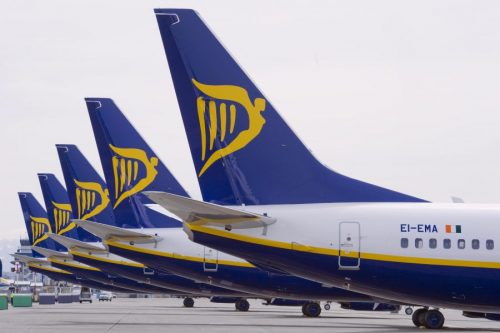Ryanair half year profits dip due to industrial unrest

Budget carrier Ryanair reported reduced first half profits today, due to higher capacity and flight cancellations caused by air traffic control strikes and staff shortages.
Revenues for the six months to September 30, rose from £3.91bn to £4.22bn.
But pre-tax profits fell from £1.27bn last year to £1.11bn this year.
The airline, which flies more than 60 routes from Manchester Airport and 35 from Liverpool John Lennon Airport, said the fall in profits was due to a 3% decline in average fares due to excess capacity in Europe, an earlier Easter in the first quarter, and repeated air traffic control strikes and staff shortages which caused a spike in cancellations of higher fare, weekend flights.
It said that higher fuel, staff and compensation costs also offset strong ancillary revenue growth, from extras such as charging for baggage, seat charges and on-board food and drink.
Ryanair chief executive Michael O’Leary said: “As recently guided, H1 average fares fell by 3%.
“While ancillary revenues performed strongly, up 27%, these were offset by higher fuel, staff and EU261 costs.
“Our traffic, which was repeatedly impacted by the worst summer of ATC disruptions on record, grew 6% at an unchanged 96% load factor.”
Passenger numbers for the six month period grew 6% from 72.1 million to 76.6 million.
Ryanair said higher fuel prices, rising interest rates and the stronger US dollar are pressurising airline margins across the market.
It warned it is inevitable that more of the weaker, unhedged, (buying future fuel supplies at lower prices) European airlines will fold this winter.
“In recent weeks Skyworks (Switzerland), VLM (Belgium), Small Planet and Azur Air (Germany), Cobalt (Cyprus) and Primera Air (Stansted & Scandinavia) collapsed.
“At the same time, many larger airlines are closing bases and cutting routes to minimise winter losses.
“We expect more failures this winter and we cannot rule out further capacity cuts or base closures in Ryanair if oil prices rise or air fares fall further.”
But it added: “Over the medium term, this consolidation will create growth opportunities for Ryanair’s lowest fare/lowest cost model.”
Ryanair also revealed that it, and other airlines, is taking legal action against the French government over repeated air traffic controller strikes which disrupt routes.
In a statement, the airline said: “Repeated ATC strikes/staff shortages means that 2018 will be the worst year on record for European ATC disruptions.
“These have caused widespread damage to airline punctuality and schedules.
“Ryanair’s H1 on-time fell to 75% from 86% (prior year), with all of this 11% decline due to ATC strikes and ATC staff shortages.
“Ryanair and other airlines have initiated legal action against the French government to keep Europe’s skies open during French ATC disruptions.
“A4E (Airlines for Europe) and Ryanair are also campaigning for the European Commission to take control of the EU air space so that overflights are not disrupted during national ATC strikes.
“This does not alter or constrain any individual’s ‘right to strike’ but tries to confine the impact of these ATC strikes to the actual country where the strike occurs.
“We continue to call for urgent action from the EC to reduce ATC disruptions.”
Russ Mould, investment director at Manchester investment platform AJ Bell, had this to say on Ryanair’s results today.
“The key takeaway from Ryanair’s results is that life doesn’t seem to be getting worse.
“A decline in profit isn’t a surprise given it had already laid the foundations for a bad set of numbers in a previous trading update.
“Instead, the market is breathing a sigh of relief that full year earnings guidance hasn’t had to be downgraded again.
“There had been some concern that ongoing disruption to its flights would put more people off from flying.
“Many travellers would prefer paying a bit more money for a ticket with an airline which hasn’t developed a reputation for flights being cancelled because of strikes or staff shortages, rather than chance their luck with Ryanair just to save a few quid.
“Nevertheless, Ryanair is still treading a thin line given its warning that full year guidance is heavily dependent on air fares not falling further, plus other factors like the oil price and the impact of Brexit developments.
“If you drill down into the latest numbers, it is the little things that count.
“For example, there has been an improved uptake of reserved seating and priority boarding.
“Ryanair has always been very good at driving up so-called ancillary revenues and shareholders will be pleased this trend remains intact.
“These little positives are welcome, yet it is worth noting that Ryanair’s profits aren’t expected to start growing again until the financial year ending March 2020.
“From an investment perspective, anyone owning Ryanair’s shares over the last three years would have lost 11% based on total return figures, which includes capital gains or losses, plus dividends reinvested.
“On the same basis, EasyJet is down 27% and the worst performer among the London-listed stocks is Flybe, down 81%.
“The best performing airline share on a total return basis is Jet2-owner Dart, up 85% over the past three years.
“Wizz Air is second best, up 38%, and British Airways-owner International Consolidated Airlines is up 8% over the same period.”




